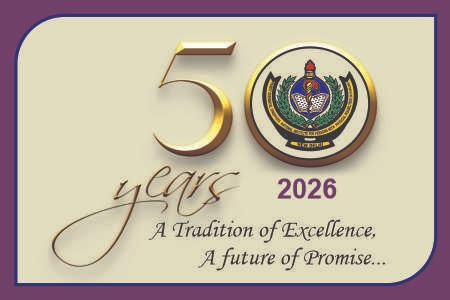Prosthetics and Orthotics
Department of Prosthetics and Orthotics
The Particulars of its Organization functions and duties
Prosthetics implies the technology dealing with artificial replacement of lost body parts which includes total limbs, or part of a limb.
Orthotics implies the technology for mechanical correction of orthopedic deformities, realignment, redirection of lines of forces in the body, support of weak parts, prevention of undesirable movement, relieving weight borne by body parts, etc.
Function and Duties
Prosthetic and Orthotic is a specialized health care profession that combines a unique blend of clinical and technological skills. The Prosthetic and Orthotic professionals assess and evaluate patients, prescribe custom designs, fabricate and fit Orthoses and Prostheses. Rehabilitation of persons with locomotor disabilities or neuromuscular disorders is team work, with the attention focused on persons with disabilities. This work requires substantial clinical and technical judgment. Prosthetic and Orthotic professionals not only provide services to persons with disabilities, but also to general health and work-related disorders such as foot disorders, fractures, sports injuries, disorders due to aging, tendinitis, muscular pain, aesthetic restoration, etc. Prosthetists and Orthotists play an important role in the comprehensive pre- and post-surgical management of persons with amputation and other neuro-musculo-skeletal disorders. They enable patients to become independent, confident, and valuable members of society through comprehensive prosthetic and orthotic management.
Manner of execution of subsidy programme (Section 4(i)(b)(xii))
(i) Name of the Programme of Activity
- Master in Prosthetics & Orthotics (MPO)
- Bachelor of Prosthetics & Orthotics (BPO)
- Certificate Course in Bench Skills (CBS)
(ii) Objective of the Programme
- Patient Care
At the end of the MPO Course, the candidates will be able to:
- Assess, prescribe, and provide comprehensive prosthetic and orthotic management to individuals and the community as appropriate to their position as members of the health care team.
- Take preventive, supportive, corrective, and rehabilitative steps regarding commonly encountered problems related to prosthetics and orthotics.
- Engage in Evidence-Based Practice in prosthetics and orthotics.
- Appreciate the psycho-social, cultural, economic, and environmental factors affecting health and develop a humane attitude towards patients/relatives in discharging one’s professional responsibilities.
- Be familiar with the various national policies and Acts related to Persons with Disabilities.
- Acquire basic management and administrative skills in the areas of materials, financial, and human resources related to prosthetics and orthotics.
- Develop communication skills to effectively interact with stakeholders.
- Practice ethical prosthetics and orthotics in patient care, service delivery, and research.
- Adopt a self-learning approach and acquire the necessary skills, including using appropriate technologies.
2. Research
The candidate should be able to:
- Identify a research problem.
- State the objectives based on the expected outcomes.
- Plan a rational approach with awareness of statistical validity.
- Outline the methodology and carry out most of the technical procedures required for the study.
- Systematically record results and observations accurately and objectively.
- Analyze data using appropriate statistical methods.
- Interpret findings in light of existing knowledge, identifying contributions and areas for further exploration.
- Draw logical conclusions and assess evidence for both its reliability and relevance.
- Write a thesis following prescribed guidelines.
- Be familiar with the ethical aspects of research.
Bachelor of Prosthetics & Orthotics (BPO)
Objective of the Programme
- Assess, prescribe, and provide comprehensive prosthetic and orthotic management to individuals and the community as a member of the healthcare team.
- Take preventive, supportive, corrective, and rehabilitative steps regarding common issues in prosthetics and orthotics.
- Engage in Evidence-Based Practice in prosthetics and orthotics.
- Appreciate psycho-social, cultural, economic, and environmental factors affecting health, and develop humane attitudes toward patients/relatives.
- Be familiar with national policies and acts related to the empowerment of Persons with Disabilities.
- Acquire basic management and administrative skills in material, financial, and human resources related to prosthetics and orthotics.
- Develop communication skills to effectively interact with stakeholders.
- Practice ethical prosthetics and orthotics in patient care, service delivery, and research.
- Adopt a self-learning approach and develop skills, including using appropriate technologies.
- The department develops human resources in Prosthetics and Orthotics through the 4 ½-year BPO course.
- It offers education, training, work adjustments, and rehabilitation services for Persons with Disabilities and related challenges.
- It conducts research and development in Prosthetics & Orthotics.
Certificate Course in Bench Skills (CBS)
Objective of the Programme
To provide bench skills training to develop bench workers for assembling and fitting orthopedic appliances, artificial limbs, and other assistive devices under the supervision of Prosthetists & Orthotists.
(iii) Procedure to avail benefits
- MPO: Entrance Exam
- BPO: Entrance Exam
- CBS: Merit
(iv) Duration of the Programme/Scheme
- MPO: 2 years
- BPO: 4 ½ years
- CBS: 1 year
(v) Physical and financial targets of the programme
- MPO: 11 seats
- BPO: 39 seats
- CBS: 20 seats
2.4 Annual Intake in the last 3 years



